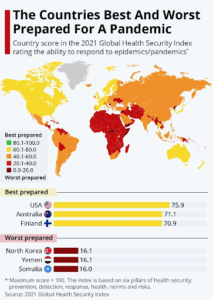In news–The second edition of GHI Index has been released recently.
About the Index-
- The Index measured the capacities of 195 countries to prepare for epidemics and pandemics.
- It has assessed countries across six categories, 37 indicators and 171 questions, using instantly available information.
- The index is developed in partnership by the Nuclear Threat Initiative (NTI) and the Johns Hopkins Center for Health Security at the Bloomberg School of Public Health, working with Economist Impact.
- It was first launched in October 2019.
- It is the first comprehensive assessment and benchmarking of health security and related capabilities across the 195 countries that make up the States Parties to the International Health Regulations.
- It benchmarks health security in the context of other factors critical to fighting outbreaks, such as political and security risks, the broader strength of the health system, and country adherence to global norms.
- The report is based on a questionnaire of 140 questions, organized across 6 categories, 34 indicators, and 85 sub-indicators. The six categories are:
- Prevention of the emergence or release of pathogens
- Early detection and reporting for epidemics of potential international concern
- Rapid response to and mitigation of the spread of an epidemic
- Sufficient and robust health system to treat the sick and protect health workers
- Commitments to improving national capacity, financing plans to address gaps, and adhering to global norms
- Overall risk environment and country vulnerability to biological threats
- As per the index, the world remains unprepared for future epidemic and pandemic threats. Countries across all income levels remain dangerously unprepared to meet future epidemic and pandemic threats.
- The world’s overall performance on the GHS Index score slipped to 38.9 (out of 100) in 2021, from a score of 40.2 in the GHS Index, 2019.
- Around 101 high-, middle- and low-income countries, including India, have slipped in performance since 2019.
- In South Asia, India, with a score of 42.8 (out of 100) too, has slipped by 0.8 points since 2019. But three neighbouring countries — Bangladesh, Sri Lanka and Maldives — have improved their score by 1-1.2 points
- In 2021, no country scored in the top tier of rankings and no country scored above 75.9.

- 73 percent of countries did not have the ability to provide expedited approval for medical countermeasures, such as vaccines and antiviral drugs, during a public health emergency.
- Most countries, including high-income ones, have not made dedicated financial investments in strengthening epidemic or pandemic preparedness.
- Around 90 countries have not fulfilled their full financial contribution to the World Health Organization. 14 of these are high-income countries.
- It says that the trust in government, which has been a key factor associated with success in countries’ responses to COVID-19, is low and decreasing.
- Around 82 percent of countries have low to moderate levels of public confidence in their government.
Source: Down to Earth
















